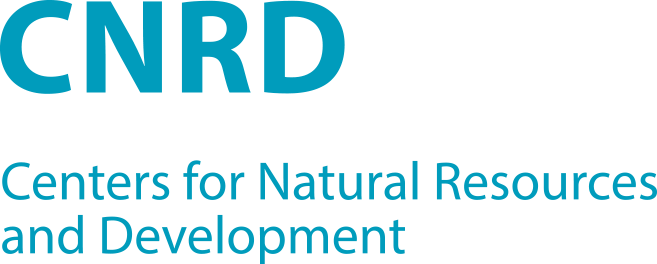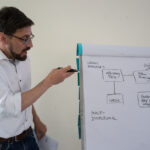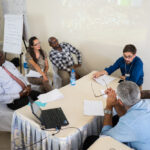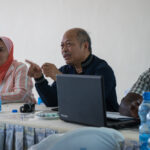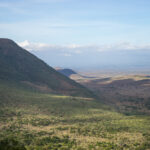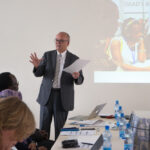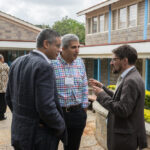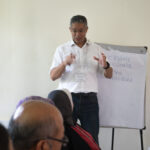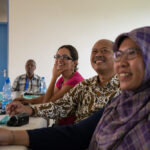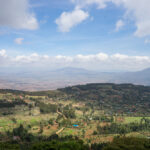July 26, 2017
CNRD members co-organize session at the World Water Congress 2017

The World Water Congress, organized by the International Water Resources Association (IWRA), the National Water Commission of Mexico (CONAGUA) and the National Association of Water and Sanitation Utilities (ANEAS) every 2-3 years, took place in Mexico this year from May 29th to June 2nd, 2017. Around 1000 experts from around the world met for knowledge exchange under the guiding theme “Bridge Science and Water Policy Making”. The Institute for Technology and Resources Management in the Tropics and Subtropics (ITT) of the TH Köln, together with Technische Universität Braunschweig and Asian Institute of Technology organized a special session on “Water Security and Climate Change: Challenges and Opportunities for Asia” referring to the conference organized under the same title in 2016 in Bangkok. The CNRD network was represented by Lars Ribbe and Alexandra Nauditt from ITT and by Tran Duc Trinh from Vietnam Academy of Water Resources.
The Congress ended with a call for action titled the “Cancun Declaration“
Prof. Dr. Lars Ribbe (Director, ITT), Prof. Dr. Rabi H. Mohtar (Texas AM University), Prof. Dr. Mukand Babel (AIT, Thailand), Alexandra Nauditt (Senior Researcher, ITT) and other representatives from the CNRD exceed Committee were speakers in the special session under the topic “Water Security in a changing world”. The session’s goal was to present and share the main outcomes of the previous conference “Water Security and Climate Change – Challenges and Opportunities for Asia” that was attended by over 150 scientists from Asia in November 2016.

Prof. Dr. Lars Ribbe was explaining about CNRD Exceed Committee, its focus areas and the relation to the WSCC Conference
May 26, 2017
The fifth “Resource Efficient Cities” Workshop was successfully conducted in Kenya

The fifth workshop of the Interdisciplinary Master Program “Resource Efficient Cities” (IMaREC), titled Training of Trainers (ToT) on “System Theory and Higher Education Didactics”, was hosted by Kenyatta Univeresity in Nairobi, Kenya from April 24 – 28, 2017. Four partner universities of the CNRD network participated in the workshop: TH Köln, Germany; ASU, Egypt; UGM, Indonesia; and UASLP, Mexico. Additionally, a representative from the University of Ghana joined the workshop as an associated partner of CNRD. Dr. Blumbach from the regional office of the German Academic Exchange Service (DAAD), Nairobi office graced the official opening of the workshop. All the participants were able to make a courtesy call to the Vice Chancellor where they were welcomed by Prof. Frederick Gravenir, the Deputy Vice Chancellor Research, Innovation and Outreach on behalf of the Vice-Chancellor of Kenyatta University Prof. Paul K. Wainaina who was outside the county.
The ToT workshop adopted a blending learning approach with three phases between online (distant) and contact phases. First phase (online), February – April 2017, explored the background and REC related knowledge level of participants through a questionnaire. Additionally, participants were provided with preparatory reading materials regarding didactics and scientific topics. The second (contact) phase in KU, April 2017, deepened the understanding of the IMaREC concepts and teaching approaches. Topics covered were City as a complex system, its metabolism, urban dynamics and the importance of interconnected responses to face its challenges, system logic / system thinking / system approach. The ToT also included introduction and practice on Problem Based Learning (PBL), as an active learning approach. The third phase (online), May – July, is planned to deepen the participants’ understanding and to apply the learnt content through tasks and assignments, which contributes to the curriculum development of IMaREC.
The workshop took place in a constructive and friendly atmosphere on Kenyatta University’s campus. It included an excursion to Nairobi peri-urban areas and Naivasha town, giving participants an insight into the rapid development and changes of the urban and rural landscape in Kenya. The participants were able to enjoy the beautiful landscape of the Great Rift Valley in Kenya.
As a next step after the workshop, the collaborating university partners will review all IMaREC modules based on the learnt workshop content.
- Prof. Dr. Johannes Hamhaber TH Köln University of Applied Sciences, Germany synthesize the workshop findings
- Exercise “Problem Based Learning”
- Prof. Dr. M. Baiquni, MA Universitas Gadjah Mada gives his feedback about the exercise “Problem Based Learning”
- East African Rift – close to Nairobi
- Dr Blumbach DAAD Regional Office informs the participants about the activities and programs of DAAD in East Africa
- Prof. Dr. Johannes Hamhaber TH Köln University of Applied Sciences, Germany discuss with Dr. Mohab Elrefaie Ain Shams University – Egypt and Dr. Mostafa Refat Ain Shams University – Egypt
- Dr. Mohab Elrefaie Ain Shams University – Egypt gives an introduction into system theory
- Prof. Dr. M. Baiquni, MA Universitas Gadjah Mada, Indonesia; Utia Suarma, M.Sc. Universitas Gadjah Mada, Indonesia; Ph.D. Lourdes Marcela López Mares Universidad Autónoma de San Luis Potosi, Mexico
- East African Rift – close to Nairobi
May 3, 2017
Water Security and Climate Change Conference is now open for Registraton!

We are pleased to announce that the WSCC Conference 2017 is now open for registration!
In this context we would like to remind you that the abstract submission portal is still open until May 31st, 2017. Don’t miss your chance to contribute to the conference and become a part of the discussion!
Achieving water security is one of the major challenges faced by society on both a global and local level today. Building bridges between disciplines, sectors and different groups of stakeholders, the conference will serve as a platform for discussions towards water secure societies. WSCC 2017 provides a stimulating environment with the intention to yield innovative ideas and grounds for implementation.
Further information on the Conference, registration as well as the link to the abstract submission platform can all be found on the WSCC Homepage watersecurity.info.
Sign up for our mailing list to be kept up to date on the latest news and keynote speakers. You can contact us via .
March 22, 2017
The Call-for-Abstracts is now open for the Water Security and Climate Change Conference 2017!
 We are pleased to announce that abstracts are now being solicited for the WSCC 2017; organized by the Centers for Natural Resources and Development – CNRD (TH Köln), the International Network on Sustainable Water Management in Developing Countries – SWINDON (TU Braunschweig) in cooperation with Food Security Center – FSC.
We are pleased to announce that abstracts are now being solicited for the WSCC 2017; organized by the Centers for Natural Resources and Development – CNRD (TH Köln), the International Network on Sustainable Water Management in Developing Countries – SWINDON (TU Braunschweig) in cooperation with Food Security Center – FSC.
Achieving water security is one of the major challenges faced by society on both a global and local level today. Building bridges between disciplines, sectors and different groups of stakeholders, the conference will serve as a platform for discussions towards water secure societies. WSCC 2017 provides a stimulating environment with the intention to yield innovative ideas and grounds for implementation.
WSCC 2017 follows the successful conference WSCC 2016 at the Asian Institute of Technology in Bangkok which united over 150 experts.
Further information regarding abstract submission instructions and evaluation criteria can be downloaded here and are available under www.cnrd.info/wscc2017
Sign up for our mailing list to be kept up to date on the latest news and keynote speakers
February 7, 2017
Upcoming Water Security and Climate Change Conference 2017

We are pleased to announce that the renowned society of water experts will come together once more for the second international Water Security and Climate Change conference. Academics and practitioners from various sectors are set to discuss the diverse facets of water security in dynamic environments and its relation to climate variability and change.
Achieving water security is one of the major challenges faced by society on both a global and local level today. Building bridges between disciplines, sectors and different groups of stakeholders, the conference will serve as a platform for discussions towards water secure societies by providing a stimulating environment with the intention to yield innovative ideas and grounds for implementation.
WSCC 2017 follows the successful conference WSCC 2016 at the Asian Institute of Technology in Bangkok which united over 150 experts. It is convened by CNRD (TH Köln) , SWINDON (TU Braunschweig) and other partners of the Exceed network under the umbrella of the Academic Year 2017, which focuses on Water as declared by the Cologne Science Forum .
Please mark these dates in your calendar. Information about the registration process will be placed online soon under www.cnrd.info/wscc2017
Sign up for our mailing list to be kept up to date on the latest news and keynote speakers
Click here for the Save-the-Date Pdf.
January 23, 2017
Vision or Reality – Benefit Sharing in the Eastern Nile Basin
You are currently viewing a placeholder content from Default. To access the actual content, click the button below. Please note that doing so will share data with third-party providers.
December 21, 2016
Workshop on Overcoming the Challenges of Land Use Changes in the Transboundary Mara Basin

The Research Workshop: “Overcoming the Challenges of Land Use Changes in the Transboundary Mara Basin” took place from the 21st to the 25th of November in the Narok County, one of the counties relating to the Mara River Basin. The workshop is one of this year’s research measures supported by CNRD and was organized by Prof. Dr. James B. Kung’u from the Kenyatta University and Dr. Rui Pedroso from the TH Köln. The Mara River Basin is a transboundary basin shared between Kenya and Tanzania. The catchment area of the basin is ca. 13,750 km². The upper part is 8,941 km² large and located in Kenya making about 65% of the whole basin. The lower part is located in Tanzania with an area of ca. 4,809 km², which is about 35% of the whole basin. It is the lifeline to the Maasai Mara and Serengeti Game reserves, world-famous for their rich biodiversity. Mara River plays a very important ecological role, especially during the annual wildlife migration between the two parks. Mara River also supports very rich natural forests at its source on the Mau Escarpment, large-scale mechanized farming, smallholder subsistence farms, communal pastoral grazing lands and some wetlands. The river drains into the Lake Victoria and ultimately forms the upper catchments of the Nile Basin. The Mara basin is considered to be one of the more serene sub-catchments of the Lake Victoria basin. This perception notwithstanding, there is growing evidence of unprecedented land use change in the upper catchments, resulting from deforestation affecting the headwaters, while current privatization of pastoral lands is attracting immigrants to the watershed with the population growth reaching 7% annually. This deterioration from the “pristine” catchment affects the hydrology of the Mara river and its environments, with great adverse impacts on wildlife and humans. There is need to determine the impacts of land use change on the Mara basin, consequent impacts on the flow regimes of the river and to identify solutions for overcoming the challenges of the land use change. The proposed research workshop will bring stakeholders together to identify the challenges and develop a research proposal for the Mara basin.
Researchers from different organizations such as Kenyatta University, ITT TH Köln, Ministry of Environment and Natural Resources, World Agroforestry Centre, Maasai Mara University, UNEP, Kenya Forestry Service, Narok County government and NGOs were brought together to identify the challenges and to give advice on the way forward. Various research methods and tools for the study were discussed to identify changes in land use/cover, hydrology and hydrochemistry impacts. Another focus of the workshop was the identification and discussion of the most suitable landscape rehabilitation methods, their potential impacts on the watershed services and involved costs.

November 25, 2016
Water balance and accounting for the Eastern Nile using advanced methodologies
From the 14th to 16th of November 2016, a workshop on “Water balance and accounting for the Eastern Nile using advanced methodologies” was hosted by the Water Research Center (WRC), University of Khartoum. This workshop was sponsored by the Center for Natural Resources and Development (CNRD) at the ITT, Cologne University of Applied Sciences.
The workshop gathered participants from Ethiopia, Sudan and Egypt, who come from academia and governmental bodies. In the three day workshop, intensive sessions of presentations and discussion were conducted. The main theme was investigating the potentiality of using advanced methodologies, products and tools in water balance and accounting for the Eastern Nile region.
The sessions included presentations covering a wide spectrum of data, methods and tools which could be useful in developing accurate water balance and water accounting for this area. Among others, sessions included cases on using remote sensing to estimate actual evapotranspiration and rainfall and evaluating hydrological models. Several participants showed applications of using remote sensing to manage surface water and groundwater, and many applications on identifying potential water harvesting sites.
Many participants contributed to the theme by showing case studies of real applications of products, methods and tools. For instance, using remote sensing data to advance multi-criteria drought index, and using satellite-based actual evapotranspiration to analyze the efficiency of water use in agricultural schemes. Moreover, validation of open-source precipitation data on river basin level and using these data for water accounting in the Nile basin region were presented and discussed extensively.
Results of the fruitful discussions during this workshop emphasized the importance of advanced approaches in water resources management generally, and specifically in estimating water balance and conducting water accounts. One of the major outcomes of this workshop was developing a research concept using these advanced approaches for water accounting to ensure food security in the region. This research concept has potential to act as a collaborative effort, where researchers, governmental bodies and other stakeholders could work jointly in using these advanced data and tools and following these up-to-date methods. The ultimate goal of this research is to develop useful products needed by end users to ensure water and food security in this area.
November 14, 2016
A Film about the Excellence Centers for Exchange and Development (Exceed)
Here is a short film by the Deutsche Welle Akademie, which presents the Exceed project and how it tackles wicked problems such as forced migration.
https://www.youtube.com/watch?v=UwJ5AdjdQAw
The program “Higher Education Excellence in Development Cooperation” (Exceed) is composed of five German higher education institutions – Technical University Braunschweig, University of Hohenheim, University of Kassel, TH Köln (University of Applied Sciences) and Ludwig-Maximilians-University München. Exceed was established by the German Academic Exchange Service (DAAD) in 2009 and funded by the Federal Ministry for Economic Cooperation and Development (BMZ) since its inauguration. Since then, these centers in collaboration with their 37 partners in developing countries, have been establishing think tanks to contribute to the post-2015 development agenda.
November 14, 2016
CNRD partner universities join forces at the annual network meeting at Vietnam Academy for Water Resources, Da Nang

From October 31 – November 04, 2016, 36 representatives from 20 CNRD partner universities as well as members of the CNRD Advisory Board came together at this year’s network meeting, hosted by Vietnam Academy of Water Resources (VAWR) in Da Nang, Vietnam. Particularly gratifying at this year’s meeting was the participation of four new partners of the network. This shows, on one hand, the high relevance of CNRD and its topics in this world. On the other hand, the network expansion is also a confirmation of the efforts made so far and the work done in recent years. The fact that all new partners have been integrated directly into the planning of the activities for 2017 is a positive signal for the future and represents a further milestone in the consolidation of a sustainable network, which has declared its goal to continue even after the end of the funding period in 2019. Following this logic, the meeting focused on strengthening sustainable collaboration structures among the partners, defining future activities and developing an outlook for the following years. The network meeting started with warm welcome notes from the hosting university CNRD partner Prof. Tung Phong Nguyen and the Director General of VAWR Prof. Nguyen Vu Viet.
The first day of the network meeting was conducted in form of a symposium. CNRD had the opportunity to present its activities and achievements of the last years to the public and regional stakeholders from the Ministry of Science and Technology (MOST), Ministry of Agriculture and Rural Development (MARD), the World Bank (WB), representatives from CNRD’s donor the German Academic Exchange Service (DAAD) and Asian Disaster Preparedness Center (ADPC) – just to name a few. In various roundtable discussions, potentials for cooperation within the scope of research and education were elaborated and identified. A basis for future cooperation was created.
In the short time of the meeting, it was possible to successfully define the planning for 2017. Through intensive cooperation of the participants, numerous activities were prepared and a concrete schedule was made. Noteworthy and appreciated by all participants was the exploration of common interests and the interdisciplinary approach of the CNRD. Particularly pleasing is the fact that different (new) working groups were formed here and that these common interests have been transferred directly into joint workshops and other activities.
[ngg_images source=”galleries” container_ids=”2″ sortorder=”8,9,10,11,13,14,15,12,16,17,18,19,20″ display_type=”photocrati-nextgen_basic_thumbnails” override_thumbnail_settings=”0″ thumbnail_width=”240″ thumbnail_height=”160″ thumbnail_crop=”1″ images_per_page=”20″ number_of_columns=”2″ ajax_pagination=”0″ show_all_in_lightbox=”0″ use_imagebrowser_effect=”0″ show_slideshow_link=”0″ slideshow_link_text=”[Show slideshow]” order_by=”sortorder” order_direction=”ASC” returns=”included” maximum_entity_count=”500″]



